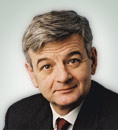China's Growing Global Military Presence: Walk Softly and Carry a Small Stick
The alarm bells that are ringing among various governments and in the press with respect to China's growing global military presence are overdone. Yes, in doing so, China is indeed seeking to expand its global political, as well as its ability to project its military power abroad. As the world's second largest economy and de facto superpower, what, exactly, would the West and its neighbors expect it to be doing? The difference is, unlike when the other Great Powers sought to expand their own global reach, China actually has little ability to project its power at the present time.
Not Really a String of Pearls
For more than a decade now, the West has been pounding the 'String of Pearls' drum, arguing that China has been seeking to secure its flow of natural resources from around the world by using its economic and military relationships with governments throughout Asia to establish numerous military facilities throughout the region. There is some truth to this, of course, with the Chinese having either financed, established or having access to ports in Myanmar, Sri Lanka, Bangladesh and Pakistan. But a recent report from the Institute for National Strategic Studies (INSS) notes that, based on its long-standing foreign policy principles and objectives, there is little reason to believe that China will make much additional headway in pursuing more in the way of a String of Pearls, and there is actually no evidence that China is using any of these sites for military activities.
Moreover, China's history in the region are still prominent in its popular memory, given Beijing's 1979 invasion of Vietnam, its support of the Pol Pot regime in Cambodia (1976-1979), and accusations of involvement in Indonesia's 1965 coup. Furthermore, China still has unresolved border disputes with several nations in the region, including Bhutan, Taiwan, Japan, Vietnam, the Philippines, and Malaysia, as well as claiming a sizeable chunk of the Indian state of Arunachal Pradesh. These will presumably make it difficult for China to achieve much more in the way of an enhanced naval presence elsewhere in Asia.
China's ongoing regional disputes over the Senkaku, Spratly, and Paracel Islands have only exacerbated regional tensions. China's 'nine dash dotted line' -- which denotes an imaginary maritime boundary extending hundreds of miles beyond its internationally recognized Exclusive Economic Zone into the South China Sea - will never stand up in international court, but that has not prevented China from assertively pursuing its territorial claims there. Its recent construction of air strips in the South China Sea is as much intended to intimidate its neighbors as to project its military power.
Not Taking Africa by Storm
The Chinese have been trying to establish a military base in the geo-strategically significant nation of Djibouti for years, whose president recently said that China's presence there would be welcome, which is hardly surprising given how close the two countries have become economically. Both countries signed an agreement last year allowing for a Chinese naval presence, and now Beijing is intent on building a permanent military base in the northern city of Obock.
Djibouti already serves as the U.S. military headquarters on the African continent, where the U.S. projects its own power in Africa and the Middle East. Both France and Japan also already have a presence there, and Djibouti is routinely used by other navies to battle pirates in Somalia. If it does build a military installation there, China will just be one more country that recognizes Djibouti's strategic importance and seeks to project its power from the tiny country.
As South Sudan's number one foreign investor, China has come to play an unusually active role in an effort to resolve the ongoing conflict there. Such involvement contradicts China's traditional doctrine of non-interference in foreign countries' domestic disputes, but Beijing's economic and geopolitical interests in South Sudan have convinced it to bend its rules. China has high stakes in both Sudan and South Sudan, having invested $20 billion in Sudan prior to the 2011 partition, and an additional $8 billion in South Sudan following its secession. While playing its diplomatic role, China also happens to be the government's top weapons provider. Last year China sold $38 million worth of ammunition, grenade launchers, machine guns and missiles to South Sudan's government.
As a result, many voices in South Sudan and the international community have accused Beijing of prolonging the conflict. Some rebel figures have also criticized Beijing, claiming it is playing a contradictory role by arming South Sudan's military while investing time, effort and money in peace talks. South Sudan's rebels do not view China as a legitimate or genuine peace broker, and accuse it of playing peacemaker simply to protect its oil interests. Such a perception can only be heightened by China's deployment of 700 troops to the South Sudanese states of Unity and Upper Nile, in an effort to safeguard China's workers and assets. It marks Beijing's first contribution of a battalion to any UN peacekeeping force. Some might ask, what took it so long to do so?
China has expressed interest in building "Overseas Strategic Support Bases" in a number of other African locations, such as Tanzania, Kenya, Mozambique, Namibia, Madagascar, Nigeria and Angola. Given Beijing's growing dependence on Africa's natural resources, protecting its energy investments across the continent will continue to drive its Africa foreign policy. China is hardly taking Africa by storm -- nor could it, given its current military capabilities. Rather, it is carefully and adeptly increasing both its presence and its influence on the continent.
Walking Softly and Carrying a Small Stick
China does not subscribe to the concept of 'spheres of influence', but it does deploy military assets when it believes its interests are threatened. Beijing is perhaps a generation away from having a meaningful blue water navy, so in the interim it has resorted to the pursuit of non-military activities, such as disaster relief and combating piracy. It has also enhanced military exchanges with a broad range of countries in Asia and beyond, and ramped up 'military diplomacy', engaging in anti-piracy exercises, increased naval visits, and 'technical service' stops at ports around the world.
This expansion of China's 'soft' military presence abroad is an effort to protect its commercial interests, as well as being consistent with its growing and increasingly important role on the global stage. It is easier for China to gradually enhance this soft military presence given its belief in non-interference in other countries' internal affairs, and more generally, its adherence to principles of non-alignment. President Xi's launching of the 21st Century Maritime Silk Road Project and Beijing's '1+2+3' strategy -- both of which seek to enhance China's infrastructure and economic capabilities -- appear to be based more on economic than political or military considerations.
Of course, it can easily be argued that both initiatives have a 'dual use' connotation, but even if this were to be the case, it has to be based on longer term, rather than short or medium-term objectives. This is ultimately what concerns Western military strategists. And yet, as the INSS states in its report, China does not appear to be building a covert logistics infrastructure to fight either the U.S. or India. Its strategy of creating access to a limited number of military bases, combined with access to overseas commercial facilities, will only create a 'light' military footprint.
Most of China's military budget is dedicated to securing its borders through a robust army and air force. It has only one aircraft carrier (which it did not build) and very little ability to project its power on the high seas. Creating a blue water navy is a very costly, complicated and time consuming proposition, which China is decades away from achieving. So, China really has no choice but to walk softly and carry a small stick. Its near-term efforts aimed at establishing greater military influence in the world will likely prove to be much ado about very little for many years to come. Beijing's preference to let others do the fighting and then swoop in after the fact for the commercial spoils in war zones is unlikely to change for a long time to come.
Daniel Wagner is CEO of Country Risk Solutions and author of "Managing Country Risk", please see below for link to Amazon. For Country Risk Solutions' web site, please click here.
You can follow Daniel Wagner on Twitter: www.twitter.com/countryriskmgmt
To follow what's new on Facts & Arts, please click here.
Buy the Book:

This article is brought to you by the author who owns the copyright to the text.
Should you want to support the author’s creative work you can use the PayPal “Donate” button below.
Your donation is a transaction between you and the author. The proceeds go directly to the author’s PayPal account in full less PayPal’s commission.
Facts & Arts neither receives information about you, nor of your donation, nor does Facts & Arts receive a commission.
Facts & Arts does not pay the author, nor takes paid by the author, for the posting of the author's material on Facts & Arts. Facts & Arts finances its operations by selling advertising space.





















